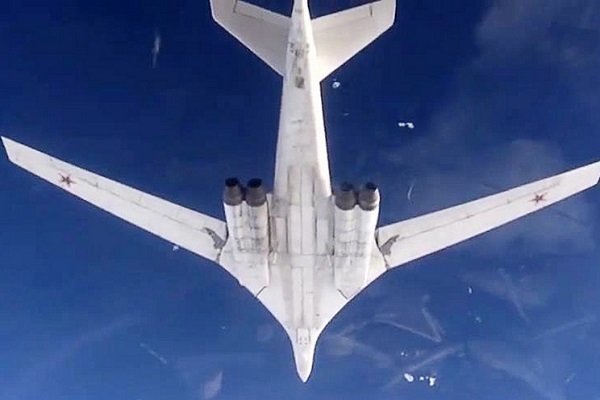Russian White Swans in the U.S. backyard; Washington terrified

The Tupolev Tu-160 is a supersonic, variable-sweep wing heavy strategic bomber
designed in the Soviet Union. It is the largest and heaviest combat aircraft,
the fastest bomber now in use and the largest and heaviest variable-sweep wing
airplane ever flown. Its flight range reaches 12,000 km without refueling and is
therefore considered a part of Russia's strategic weaponry.
The Tupolev Tu-160 is a strategic ultrasonic bomber capable of carrying nuclear
warfare. In addition to the Tu-160 bombers, an An-124 and an Ilyushin IL-62
airliner landed in Venezuela. Russian Defense Minister Sergey Shoygu said two
the bomber planes were accompanied by two fighter planes, but did not indicate
whether the planes were armed or not.
This Russian action in Latin America is not a routine military measure. For
example, the Associated Press reported that the last time the Tupolev 160 planes
were sent to Venezuela was five years ago. Before that, in 2008, after the
military crisis between Russia and Georgia, Russia was sending a military fleet
to Venezuela.
Washington’s fear and Russia’s response
Following the fall of Venezuela's strategic bombers, Americans were terrified,
as U.S. Secretary of State Mike Pompeo wrote on Twitter, "two corrupt
governments squandering public funds, and squelching liberty and freedom while
their people suffer.”
On a conference call on December 11, the spokesman for the Kremlin, Dmitry
Peskov, told reporters that it’s "absolutely inappropriate” for Pompeo to call
the Russian government corrupt and called the statement "undiplomatic” and
"completely unreliable”.
Peskov also said, "We are opposed to the remark that we are wasting people's
money, while the statement is made by the Foreign Minister of a country whose
half military budget would be enough to feed all of Africa.”
Caracas welcomed Russian White Swans
Caracas welcomed the arrival of Russia’s Tu-160 strategic bombers as an
opportunity to show the will to defend its country against possible foreign
military intervention.
Venezuela’s Defense Minister Vladimir Padrino Lopez said, "The two countries
have been building more than cooperation, a real friendship in all areas, with a
special focus on military development. The Russian-Venezuelan joint ventures
show a boost for the purpose of integrating airborne equipment, in terms of
technical cooperation and exchange of experiences. No one in the world is afraid
of the presence of logistical aircraft landed in Venezuela. We are makers of
peace, not war. We are ready to defend Venezuela if necessary, until the end. We
do this with our friends who defended the respectful relations among the
countries.”
Russian Ambassador to Venezuela Vladimir Zaemsky said on Monday that
military-technical cooperation between Moscow and Caracas has been developing
very actively of late.
Experts’ views
Abdel Bari Atwan, a prominent international affairs analyst, has said, "A new
chapter of the Cold War is taking place between Russia and the US in different
parts of the world that has become more evident with the deployment of Russia’s
strategic bombers to Venezuela. This is Moscow’s warning message to Washington.
The arrival of Russian bombers in the South American country has angered the
U.S. government since it did not expect it. The U.S. is sensitive to South
America and doesn’t welcome Russia or other countries to get close to the
region.
When Venezuelan President Maduro went to Russia, he pledged for help, and the
Russian President immediately sent two bomber planes as expressing his support
to Caracas. The US overthrew the Colombian, Brazilian and Argentinian
governments, which were largely left-wingers, and brought the right parties
instead. The U.S. has done all in power for its political, economic and military
influence.
Trump’s policy is not just a threat to the world, the Middle East and South
America, but it is also a threat to America itself. Washington's military and
economic movements against Caracas and the elected President of Venezuela have
made the country to open up to the Russians. It is not unlikely that this South
American country would do the same as Syria, allowing Russia to establish
military bases in its soil.
Syrian President Bashar al-Assad sought help from Russia against the U.S.-led
counterinsurgency plan for his government. Putin at once dispatched troops,
fighters and the S-300 to defeat the U.S. plan. The U.S. power is gradually
declining.
It is undeniable that the U.S. monopoly in the international arena has come to
an end, and it cannot be overthrown any government on the pretext of democracy.
With the interference of Russia, the U.S. has failed to overthrow the Assad’s
government. Now, Russia is playing in the U.S. backyard in Syria which has
alarmed Washington.
This becomes important when we review similar incidents during the Soviet era.
When the US failed to overthrow Castro's Communist regime, during the operation
of the Swine Gulf, Cuba thought of getting help from Soviet Union to protection.
The Soviet Union, which was already worried about the US missile bases in Italy
and Turkey, transferred its nuclear missiles to Cuba with passion. The U.S.
intelligence realized it when it was too late, and that the materials needed for
missiles were already transferred to Cuba. Although there were talks of air
strikes to Cuban missile sites, Kennedy decided to resolve the crisis with
diplomacy.
In any case, the landing of Russian strategic bombers in Venezuela, in addition
to American fears, has pushed US-dependent states in South America, including
Colombia to react. The country has objected to the presence of Russian strategic
bombers in Venezuela, in line with White House policies. Washington has sensed
the danger, especially since these bombers can target locations within the U.S.
Source:TehranTimes
















